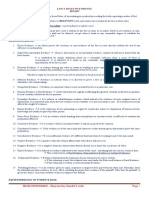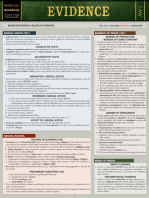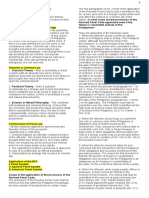Evidencess PDF
Evidencess PDF
Uploaded by
Ma Roxan DanoCopyright:
Available Formats
Evidencess PDF
Evidencess PDF
Uploaded by
Ma Roxan DanoOriginal Description:
Copyright
Available Formats
Share this document
Did you find this document useful?
Is this content inappropriate?
Copyright:
Available Formats
Evidencess PDF
Evidencess PDF
Uploaded by
Ma Roxan DanoCopyright:
Available Formats
Criminal Jurisprudence Evidence: For evidence to be admissible it
Terms, Definitions, Notes, etc. must be Relevant (RELEVANCY TEST)
See; Revised Rules on Evidence
(Rules 128-134, Rules of Court)
FACTS + PROOF = EVIDENCE
Importance of Evidence: Factual Information
➭ Duty of every law enforcement agency to
provide the prosecution with the materials and
information on the evidence necessary to support a
conviction. Kinds of Evidence:
Note: an accused enjoys the “Presumption of 1. Character Evidence
Innocence” hence, the has the burden to overcome this
Evidence of a person’s moral standing or
presumption by
“Proof beyond reasonable doubt”
personality traits in a community based
‘Presentation of Evidence’ on reputation or opinion.
2. Circumstantial Evidence
Evidence aids the judge in the construction of
The proof from which taken either singly
the chain of events from the conception up to
the consummation of the criminal design. or collectively, the existence of a particular
fact in dispute may be inferred as
FACTUM PROBANDUM necessary or probable consequences.
๑ Ultimate facts to be proven, 3. Competent Evidence
proposition of Law. When it is not excluded by law in a
Ex: Murder was committed through treachery,
robbery was committed.
particular case.
Obviously evidence by law is incompetent.
FACTUM PROBAN
4. Conclusive Evidence
๑ Evidence (Evidentiary- things should be
Incontrovertible evidence
proven) facts, addressed questions of
facts.
Evidence which the law does not allow to
Ex: Exit wound in front indicates that the be contradicted.
victim was shot at the back destroyed back
indicates force upon things.
5. Corroborative Evidence
Additional evidence of a different kind and
EVIDENCE
character tending to prove the same point
Note: as that of previously offered evidence.
1. Rules of evidence shall be the same
in all courts; in all trial and hearing 6. Cumulative Evidence
2. Evidence is admissible when it is Additional evidence of the same kind
relevant to the issue and is not
excluded by Law (competent) bearing on the same point.
3. Evidence is relevant if it has 7. Demeanor Evidence
relation to the fact in issue as to
induce belief it is existence or non- The behavior of a witness on the witness
existence. stand during trial to be considered by the
Judge on the issue of credibility.
8. Demonstrative Evidence
That has tangible exampling purpose.
9. Direct Evidence 18. Negative Evidence
Support the truth of an assertion (in Criminal This denies the controversy of the fact.
Law, an assertion of guilt or of innocence) directly, i.e., 19. Object/Real Evidence
without an intervening inference. Addressed to the senses of the court
Ex: a witness who testifies that they saw the (Sight, Hearing, Smell, Touch, Taste)
defendant shoot the victim - gives Direct Evidence Visible by naked eye are basically object
10. Documentary Evidence evidence.
Those consisting of writing or any material 20. Prima Facie Evidence
of written expression offered as proof of its This can stand alone to support a
contents. conviction unless rebutted.
11. Expert Evidence 21. Primary or Best Evidence
Testimony of a person. That which the law regards as affording the
12. Hearsay Evidence greatest certainty of the fact in question.
Oral testimony or documentary evidence 22. Positive Evidence
which does not derive its value from the Evidence which affirm facts in issue.
credit to be attached to the witness 23. Relevant Evidence
himself. When it has the tendency in reason to
13. Immaterial Evidence establish the probability or improbability of
Not directed to prove a fact in issue as a fact in issue.
determined by the rules of substantive law 24. Secondary Evidence
and of pleadings. That which indicates the existence of a
14. Inadmissible Evidence mere original source of information.
This is irrelevant to the issue or which is 25. Substantial Evidence
excluded by the rules of evidence. Evidence that proceeds from the personal
15. Incompetent Evidence knowledge of the witness, simply stated.
The one who excluded by the law either Substantial Evidence is something that a
on grounds of its immateriality, irrelevancy witness saw, felt or heard.
and want of credibility or for any other Ex:
1. Witness heard the perpetrator threaten the victim
reason. 2. Witness saw the perpetrator hit the victim
3. Victim felt the perpetrator kick her
16. Irrelevant Evidence
26. Testimonial Evidence
This has no tendency in reason to
Oral ornaments given in open court by the
establish the probability or improbability of
witness.
a fact issue.
17. Material Evidence _____________________________________________________________________
This is material to the question in
controversy, and must necessarily enter Rule 129- What need not be proved
into consideration of the controversy, and Judicial Notice
which by itself or in connection with the No need to introduce evidence
mandatory
other evidence is determinative of the Ex: Existence and territorial extent of
case. states, political history, forms and
government.
Discretionary
Collateral Matter
– Matters of public knowledge, matters (Document)
known to judges because of their
Matters other than the fact in issue in which
judicial functions.
the offender as a basis or inference as to the
Judicial Admission existence of the fact in issue.
Does not require proof and may ___________________________________________________________________
be contradicted only through. Probative Value
The tendency of the evidence to establish the
proposition.
Competency Test
Not excluded by law or the rules
__________________________________________________
Testimonial Knowledge
A witness can testify only on those
facts which he knows of his own
“FRUIT OF POISONOIUS TREE DOCTRINE”
personal knowledge; that is derived (Exclusionary Rule)
from his own.
Miranda vs. Arizona
Exceptions: Definition: Illegal gain of evidence(s)
1. Police Investigation Report
2. Dying Declaration
PRINCIPLE OF CHAIN OF CUSTODY OF
3. Declaration against Interest EVIDENCE
4. Parts of Res Gestae (The thing itself)
If the evidence is of a type which cannot be
easily recognized or easily tampered, the
Rule 130- Rules of Admissibly
proponent must present evidence of its Chain
Object Evidence of Custody.
Those addressed to the senses of the
court when an object is relevant to The proponent must show:
the fact in issue, it may be exhibited 1st. The evidence is identified as the
same object taken from the
to, examined or viewed by the
scene.
court. 2nd. It was not tampered with or any
Documentary Evidence alteration can be sufficiently
explained.
Writings or any material containing
letters, words, numbers, figures,
symbols or other modes of written
expression offered as proof of their
contents.
Rules regarding Documentary
Evidence:
Best Evidence Rule
- When the subject of inquiry is the contents of a
document, no evidence shall be admissible except
the ORIGINAL Document.
Exceptions:
1. When the original is lost, destroyed
or cannot be produced without bad
faith on the offeror.
2. When the original is in the custody
of the party against whom the
evidence is offered and he fails to
produce it despite notice. “When you feel like quitting,
Think about why you started”
You might also like
- Subject: Law Enforcement Administration (20%) Direction: Choose The Correct Answer Among The Choices BelowDocument6 pagesSubject: Law Enforcement Administration (20%) Direction: Choose The Correct Answer Among The Choices BelowMa Roxan Dano100% (3)
- Fraud Examination 5th Edition Albrecht Test Bank DownloadDocument13 pagesFraud Examination 5th Edition Albrecht Test Bank DownloadMark Johnson100% (22)
- Expert WitnessDocument6 pagesExpert WitnessGeorge TsakatarasNo ratings yet
- Evidence Dean RianoDocument51 pagesEvidence Dean RianovinceresuelloghoulNo ratings yet
- Evidence ReviewDocument51 pagesEvidence ReviewAlexis EnriquezNo ratings yet
- Evidence Review From RIANODocument51 pagesEvidence Review From RIANOAnthony Yap95% (19)
- Evidence Review From Riano PDF FreeDocument51 pagesEvidence Review From Riano PDF FreeJunmark CarbonelNo ratings yet
- Evidence Review From RIANODocument51 pagesEvidence Review From RIANONovie Grace DuquillaNo ratings yet
- Notes On Evidence 2020Document32 pagesNotes On Evidence 2020Ellen SaballaNo ratings yet
- Review Notes in Criminal Evidence: Saint Mary's University - Criminology Review CenterDocument10 pagesReview Notes in Criminal Evidence: Saint Mary's University - Criminology Review CenterclarisaNo ratings yet
- EVIDENCEDocument3 pagesEVIDENCEMaica GaddiNo ratings yet
- RULES OF EVIDENCE ReviewerDocument11 pagesRULES OF EVIDENCE Reviewercaryl maano100% (1)
- Ateneo 3D Decentralized Under-Bar Operations Babyblue Tips ™Document26 pagesAteneo 3D Decentralized Under-Bar Operations Babyblue Tips ™Abegail Atok100% (1)
- Rules of EvidenceDocument14 pagesRules of EvidencepipoNo ratings yet
- Evidence v1Document23 pagesEvidence v1Kylie GavinneNo ratings yet
- Evidence Primer2000Document15 pagesEvidence Primer2000Nodlesde Awanab ZurcNo ratings yet
- On Summary Procedure, Where PartiesDocument8 pagesOn Summary Procedure, Where PartiesshezeharadeyahoocomNo ratings yet
- EVID 1st ExamDocument33 pagesEVID 1st ExamXandredg Sumpt LatogNo ratings yet
- Evidence at Your Fingertips: 2013 Bar Pre-Week NotesDocument37 pagesEvidence at Your Fingertips: 2013 Bar Pre-Week NotesRuth Del CastilloNo ratings yet
- Evid Definition TermsDocument7 pagesEvid Definition Termsstephanie linajaNo ratings yet
- Evidence Study Guide A. Define And/or Explain The Following: 1. Evidence (Rule 128, Secs. 1-4) 3. Kinds of EvidenceDocument12 pagesEvidence Study Guide A. Define And/or Explain The Following: 1. Evidence (Rule 128, Secs. 1-4) 3. Kinds of EvidenceCarylNo ratings yet
- EVIDENCE NotesDocument13 pagesEVIDENCE NotesJohn Mark AguilarNo ratings yet
- Criminal Evidence Hand OutsDocument15 pagesCriminal Evidence Hand OutsJomarie Calesterio Magbo-oNo ratings yet
- Iv. Evidence and Its Admissibility: 1. What Are The Kinds of Evidence According ToDocument57 pagesIv. Evidence and Its Admissibility: 1. What Are The Kinds of Evidence According ToRey LacadenNo ratings yet
- Hand Book On The Law On Evidence: RULES OF COURT (Evidence)Document37 pagesHand Book On The Law On Evidence: RULES OF COURT (Evidence)Neil Adonis Usaraga100% (6)
- Notes EvidenceDocument9 pagesNotes EvidenceBestie BushNo ratings yet
- CLJ 15 EvidenceDocument35 pagesCLJ 15 EvidenceHersheykris PimentelNo ratings yet
- 5 EvidenceDocument17 pages5 EvidenceArjay MartinezNo ratings yet
- Criminal Evidence 1Document16 pagesCriminal Evidence 1Jaye WolfNo ratings yet
- 1 Session. Araneta-Evidence - Custodio - AY 2015 - 2016 - Term 2 1Document145 pages1 Session. Araneta-Evidence - Custodio - AY 2015 - 2016 - Term 2 1Aster Beane AranetaNo ratings yet
- Criminal EvidenceDocument5 pagesCriminal EvidenceCary Kim AlcantaraNo ratings yet
- Rules of Evidence Admissibility of Evidence Weight of EvidenceDocument7 pagesRules of Evidence Admissibility of Evidence Weight of EvidenceJuliefer Ann GonzalesNo ratings yet
- LessonDocument8 pagesLessonKayla Kenn ArroyoNo ratings yet
- Ass 1 - Jan. 26 2019Document42 pagesAss 1 - Jan. 26 2019De Guzman E AldrinNo ratings yet
- Chapter 8Document22 pagesChapter 8Cdrex GarciadasNo ratings yet
- CLJ Activity No 3.evidence (Classification)Document2 pagesCLJ Activity No 3.evidence (Classification)Pa GarNo ratings yet
- Law 3 ReviewerDocument12 pagesLaw 3 Reviewermarsan walangNo ratings yet
- Final Examination Notes On EvidenceDocument6 pagesFinal Examination Notes On EvidenceTOLENTINO, DENSSEL L.No ratings yet
- Define The FollowingDocument2 pagesDefine The FollowingJohnpaul AlegadoNo ratings yet
- Criminal Evidence Prelim NotesDocument10 pagesCriminal Evidence Prelim NotesJohn Noel GuevarraNo ratings yet
- I. Preliminary ConsiderationDocument34 pagesI. Preliminary ConsiderationCarla Blanca Maiso100% (1)
- Criminal EvidenceDocument106 pagesCriminal EvidenceKel Vin Ton100% (1)
- RULES of EVIDENCE Quick RefresherDocument7 pagesRULES of EVIDENCE Quick RefresherJuan Doe100% (1)
- EVIDENC1Document21 pagesEVIDENC1Mj ArqueroNo ratings yet
- What Is Burden of Proof?: East Bank Trust Company vs. Roberto Mar Chante)Document4 pagesWhat Is Burden of Proof?: East Bank Trust Company vs. Roberto Mar Chante)Ria Evita RevitaNo ratings yet
- Evidence ReviewerDocument21 pagesEvidence ReviewerDessa CaballeroNo ratings yet
- Criminology Licensure Examination ReviewDocument60 pagesCriminology Licensure Examination ReviewJamie AcademicSpecialist100% (1)
- Evidence ClassificationDocument2 pagesEvidence ClassificationDF ArtsignNo ratings yet
- Classes of EvidenceDocument3 pagesClasses of EvidenceJelisaNo ratings yet
- Kinds of Evidence by AzeemDocument3 pagesKinds of Evidence by AzeemAmmar KaimkhaniNo ratings yet
- Evidence: - Sanctioned by These Rules, of Ascertaining in ADocument16 pagesEvidence: - Sanctioned by These Rules, of Ascertaining in AArceli MarallagNo ratings yet
- Riano Evidence 4Document10 pagesRiano Evidence 4Jason AmpongNo ratings yet
- Francisco Summary PDFDocument93 pagesFrancisco Summary PDFKC Galanida SangcoNo ratings yet
- Evidence ReviewerDocument92 pagesEvidence ReviewerAnonymous tyEGT2RJJUNo ratings yet
- NOTES For Evidence (Rule 130)Document4 pagesNOTES For Evidence (Rule 130)KathNo ratings yet
- Criminal EVIDENCEDocument10 pagesCriminal EVIDENCESkier MishNo ratings yet
- Midterms Evidence Alar As NotesDocument53 pagesMidterms Evidence Alar As NotesairarowenaNo ratings yet
- Kind of Evidence - Special CategoryDocument1 pageKind of Evidence - Special CategoryEshwar MNo ratings yet
- Evidence Module 1 CICOSATDocument13 pagesEvidence Module 1 CICOSATk4vspvp6hdNo ratings yet
- Lecture On Evidence: By: Prof. Stephen P. Gumboc EvidenceDocument52 pagesLecture On Evidence: By: Prof. Stephen P. Gumboc Evidenceairan atienzaNo ratings yet
- Copy (3) of Criminal Evidence NotesDocument13 pagesCopy (3) of Criminal Evidence NotesEmmanuel BuanNo ratings yet
- Pretest in Crime Detection, Investigation and PreventionDocument14 pagesPretest in Crime Detection, Investigation and PreventionMa Roxan DanoNo ratings yet
- Cdin InaDocument610 pagesCdin InaMa Roxan DanoNo ratings yet
- Pretest in Correctional Administration, Probation and Parole & Restorative JusticeDocument17 pagesPretest in Correctional Administration, Probation and Parole & Restorative JusticeMa Roxan Dano100% (1)
- Great Inertia: Pre-Test in CriminalisticsDocument13 pagesGreat Inertia: Pre-Test in CriminalisticsMa Roxan DanoNo ratings yet
- Review Questions in Law Enforcement Administration Set OneDocument34 pagesReview Questions in Law Enforcement Administration Set OneMa Roxan DanoNo ratings yet
- Special Crime InvestigationDocument24 pagesSpecial Crime InvestigationMa Roxan DanoNo ratings yet
- PREVIOUS BOAR-WPS OfficeDocument6 pagesPREVIOUS BOAR-WPS OfficeMa Roxan DanoNo ratings yet
- Corr Add No AnsDocument17 pagesCorr Add No AnsMa Roxan DanoNo ratings yet
- Complex Crimes, Composite Crimes, Continued CrimesDocument5 pagesComplex Crimes, Composite Crimes, Continued CrimesMa Roxan Dano100% (1)
- FORENSIC MEDICINE Converted CompressedDocument144 pagesFORENSIC MEDICINE Converted CompressedMa Roxan DanoNo ratings yet
- Quest Review Center: Contact Nos.: 385-4322 / 0926-372-2083 / 0909-873-3892Document6 pagesQuest Review Center: Contact Nos.: 385-4322 / 0926-372-2083 / 0909-873-3892Ma Roxan Dano100% (1)
- Lecture and Q and A Series in RA 6975 and RA 8551Document470 pagesLecture and Q and A Series in RA 6975 and RA 8551Ma Roxan Dano50% (2)
- (LEA) CompilationDocument165 pages(LEA) CompilationMa Roxan DanoNo ratings yet
- Evidence Case DigestsDocument46 pagesEvidence Case DigestsHEMERHYNI BARAGUIRNo ratings yet
- Law of Evidence: ExaminationDocument39 pagesLaw of Evidence: ExaminationAdarsh HimatsinghkaNo ratings yet
- Play Therapy With DollsDocument21 pagesPlay Therapy With DollsMa Mayla Imelda Lapa100% (1)
- Bar Qs ('09-'12)Document39 pagesBar Qs ('09-'12)Joy DalesNo ratings yet
- United States v. Cyriacus Agbada, 9 F.3d 1544, 4th Cir. (1993)Document3 pagesUnited States v. Cyriacus Agbada, 9 F.3d 1544, 4th Cir. (1993)Scribd Government DocsNo ratings yet
- Macasiray - v. - PeopleDocument7 pagesMacasiray - v. - PeopleChristine Gel MadrilejoNo ratings yet
- Pleb RulesDocument25 pagesPleb RulesChingkay Valente - JimenezNo ratings yet
- Remedial Law HandoutsDocument25 pagesRemedial Law Handoutsrobertoii_suarezNo ratings yet
- Judgement Ephrem SetakoDocument154 pagesJudgement Ephrem SetakoKagatamaNo ratings yet
- Criminal Procedure CaseDocument5 pagesCriminal Procedure CaseJEB0% (1)
- Marc Stevens - On Traffic CourtDocument3 pagesMarc Stevens - On Traffic Courtandrewhateley2625100% (3)
- Grammar - Past Simple and ContinuousDocument4 pagesGrammar - Past Simple and Continuouscarlasorogarcia46No ratings yet
- Julie Amero Full Court TranscriptDocument346 pagesJulie Amero Full Court TranscriptKevin M. Keating100% (2)
- Riser - Redacted PCAsDocument8 pagesRiser - Redacted PCAsDallas PoliceNo ratings yet
- Module No 4Document54 pagesModule No 4Kurt Bryan AnclaNo ratings yet
- 0008 - People vs. Beato 78 Phil. 682, July 02, 1947 PDFDocument8 pages0008 - People vs. Beato 78 Phil. 682, July 02, 1947 PDFGra syaNo ratings yet
- Hilario Vs City of Manila Et. Al.Document11 pagesHilario Vs City of Manila Et. Al.Erwin DacanayNo ratings yet
- Sps Sadik Vs Abdallah - MTJ-95-1053 - January 2, 1997 - Per Curiam - en BancDocument9 pagesSps Sadik Vs Abdallah - MTJ-95-1053 - January 2, 1997 - Per Curiam - en BancEliza Den DevilleresNo ratings yet
- Medico - Legal Issues in Obs & GynDocument63 pagesMedico - Legal Issues in Obs & GynKenneth mugabeNo ratings yet
- Jessa CrimlawDocument5 pagesJessa CrimlawJessa MaeNo ratings yet
- Korea Insurance & Reinsurance Laws and Regulations 2021Document10 pagesKorea Insurance & Reinsurance Laws and Regulations 2021Sayed MohamedNo ratings yet
- Richard Chichakli's Letter To The Judge For Reconsideration of A Potential WitnessDocument1 pageRichard Chichakli's Letter To The Judge For Reconsideration of A Potential WitnessGeorge MappNo ratings yet
- Bailiff's HandbookDocument4 pagesBailiff's HandbookSandor GOMBOSNo ratings yet
- Ra 9165 CaseDocument25 pagesRa 9165 CaseEunice Kalaw VargasNo ratings yet
- Chapter - 23: Collection of Oral EvidenceDocument7 pagesChapter - 23: Collection of Oral EvidenceBalu Mahendra SusarlaNo ratings yet
- Samonte vs. JumamilDocument5 pagesSamonte vs. JumamilPaul Joshua SubaNo ratings yet
- ZIM-421 - Further HC SubsDocument12 pagesZIM-421 - Further HC SubsJanani BaneelaNo ratings yet
- Criminology Study Guide CMY3702Document172 pagesCriminology Study Guide CMY3702Skye WarrenerNo ratings yet







































































































